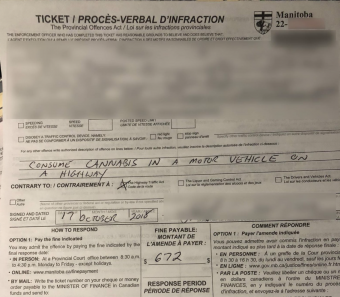Features
How to catch a stoned driver
Published on October 23, 2018 by Don Plant

Riddle me this, riddle me that: “Is Minnie Mouse a dog or a cat?”
So you’re going out with friends tonight and feel like celebrating legal cannabis with a toke for the road.
Now that recreational weed is aboveboard you’re good to go, right? The cops can’t stop you if you’re smoking a joint in the car, can they?
Actually they can. Even though cannabis is a legitimate product as of Oct. 17, police are authorized to make your life pretty miserable once they suspect you’re stoned behind the wheel. If they ticket you enough for driving under the influence, you could lose your licence for three to five years and face thousands in fines.
Still, police have some catching up to do. For now, most forces are doing without devices that examine a driver’s saliva for recent drug use. Instead, they’re relying on officers trained to recognize drug-impaired drivers by putting them through a series of roadside tests, like following the officer’s finger with your eyes or asking confounding questions like “is Minnie Mouse a dog or a cat?”
Trouble is…
Not enough drug recognition experts (DREs) are certified to conduct those tests. The Canadian Association of Chiefs of Police has set a target of 2,000 DREs but fewer than 900 municipal officers and 240 Mounties have been trained.
Ottawa has introduced three new offences aimed at motorists who’ve consumed drugs within two hours of driving. They set limits on how much THC — the chemical in cannabis that makes you high— can be in your system while operating a vehicle. If you’re caught with two to five nanograms of THC in a millilitre of your blood, you could get stuck with a $1,000 fine. If you have more than five nanograms of THC or police find you’ve been drinking alcohol and using weed at the same time, you face a one-year driving suspension or possible jail time.
For police to calculate how much THC is in your blood, you need to give a blood sample. And few if any police departments across the country are equipped to draw blood from a suspect.
Until that happens, they have to rely on trained officers to detect drug-induced impairment.
Punishing power
That gives police sweeping powers to accuse, prosecute and punish you outside the courtroom. Lawyers complain drivers have little recourse to defend themselves if they didn’t sleep last night or have some medical condition that makes them appear stoned. Unlike alcohol impairment, you have to take your case to BC Supreme Court to argue you’re innocent of a cannabis-related driving ticket, a review process that could cost you $5,000 or more.

Kelowna lawyer Joe Gordon
One compromise would be opening blood labs around the clock so suspects can get their blood-THC level checked right away, said Kelowna lawyer Joe Gordon, who has defended people charged with impaired driving by alcohol or drugs for 40 years.
“You frequently can’t get to a lab because they’re closed on weekends . . . There needs to be a mechanism in place that allows the public to immediately have their blood tested. That would be on weekends or during the night.”
The Draeger DrugTest 5000
A few police forces are trying out the Draeger DrugTest 5000, the only government-approved device that checks your saliva for THC and other drugs. Most senior officers point to its unreliability in cold weather and other concerns, so they’re holding off ordering the $6,000 machines. The RCMP recently bought 20 Draeger devices for training but won’t say when officers will deploy them on the road.
The new laws don’t distinguish between recreational and medical users. Most courts will accept a DRE’s opinion that a driver was inebriated, said Gordon, but chronic users who haven’t consumed cannabis in 24 hours may still have a high THC level when they aren’t impaired.
“An alcoholic’s blood-alcohol content is always at a certain level,” he said. “And they’re functioning. Why wouldn’t that apply to THC?”
There’s really no cannabis-testing tool that’s as reliable as the assisted screening device police use to assess a driver’s alcohol content. For now, an officer who stops you for drug-impairment can only call in a DRE to examine you.
Gordon wonders how available the experts will be at 3 a.m. To avoid trouble, he recommends caution — refrain from drugs or alcohol before you take the wheel and place all products in the trunk.
Lawyer’s advice
For God’s sake don’t puff in the car and risk a cop busting you as soon as you roll down the window.
“Pot has a distinct smell. It reeks. You can’t get rid of it with a couple of mints.”
##
This story appeared in our Oct. 24, 2018, newsletter.
Leave a comment on our Facebook page.
© Copyright 2018 Okanagan Z. | About the oz.
Report a Typo or Inaccuracy
We strive to avoid typos and inaccuracies. However, on occasion we make mistakes. We value your contributions and help in correcting them.
